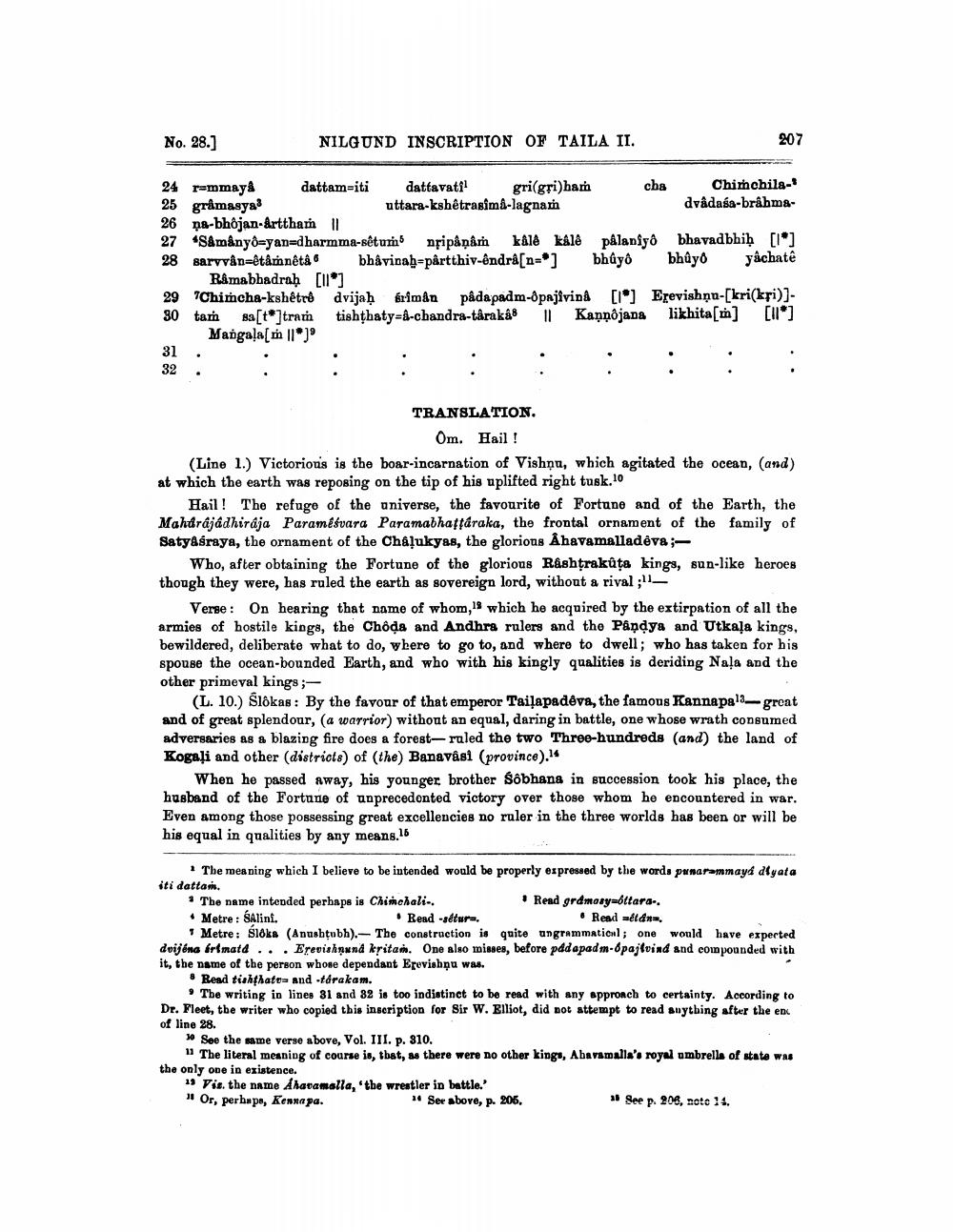________________
No. 28.]
NILGUND INSCRIPTION OF TAILA II.
207
24 remmaya d attam=itidattavatii g ri(gri)ham cha Chimchila-' 25 gramasyal uttara-kshetrasima-lagnam
dvadasa-brâhma26 na-bhojan-Arttham 11 27 "Samányô=yandharmma-sêtum nfipâņam kald kale pålaniô bhavadbhiḥ [1] 28 Barvvån=ôtårneta o bhävinab=pårtthiv-êndra[n="] bhyo bhûyo yachatê
Råmabhadraḥ [ll] 29 Chimcha-kshetra dvijah briman påda padm-Opajivina [1] Erevishņn-[kri(kri)]30 tar sa[t*]tra tishțhaty=8-chandra-tárakâ8 11 Kaņpôjana likhita[m] [11*]
Mangaļa[m ||*)
TRANSLATION
Om. Hail ! (Line 1.) Victorionis is the boar-incarnation of Vishnu, which agitated the ocean, (and) at which the earth was reposing on the tip of his uplifted right tusk.lo
Hail! The refuge of the universe, the favourite of Fortune and of the Earth, the Mahdrájádhiraja Paramésvara Paramabhattáraka, the frontal ornament of the family of SatyAsraya, the ornament of the Chalukyas, the glorious Åhavamalladeva;
Who, after obtaining the Fortune of the glorious Rashtrakūta kings, sun-like heroes though they were, has ruled the earth as sovereign lord, without a rival ;11—
Verse: On hearing that name of whom, which he acquired by the extirpation of all the armies of hostile kings, the Choda and Andhra rulers and the Pandya and Utkala kings, bewildered, deliberate what to do, where to go to, and where to dwell; who has taken for his spouse the ocean-bounded Earth, and who with his kingly qualities is deriding Nala and the other primeval kings;
(L. 10.) Slokas: By the favour of that emperor Taiļapadeva, the famous Kannapa 3-great and of great splendour, (a warrior) without an equal, daring in battle, one whose wrath consumed adversaries as & blazing fire does a forest-ruled the two Three-hundreds (and) the land of Kogaļi and other (districts) of (the) Banavasi (province)."
When he passed away, his younger brother Sobhana in succession took his place, the husband of the Fortune of unprecedented victory over those whom he encountered in war. Even among those possessing great excellencies no ruler in the three worlds has been or will be his equal in qualities by any means.16
1 The meaning which I believe to be intended would be properly expressed by the words punarammayd olyata iti dattan. * The name intended perhaps is Chinchali..
Read grdmasy=óttars.. • Metre : Salini.
Read-séturs.
• Read mélan. Metre: sloks (Anushţubh).- The construction is quite ungrammatical; one would have expected dvijana frimata ... Erevishnund kritan. One also misses, before pdd apadm-6pajivind and compounded with it, the name of the person whose dependant Erevishņu was.
* Read tishthato= and tarakam.
. The writing in lines 31 and 32 is too indistinct to be read with any approach to certainty. According to Dr. Fleet, the writer who copied this inscription for Sir W. Elliot, did not attempt to read suything after the en of line 28.
30 See the same verse above, Vol. III. p. 810.
The literal meaning of course is, that, as there were no other kings, Abavamalla's royal ombrells of state was the only one in existence.
13 Vit. the name Ahatamalla, 'the wrestler in battle.' "Or, perhaps, Kenrapa.
# Ser above, p. 206.
* See p. 208, noto 11.




